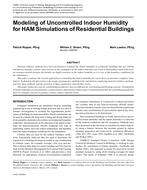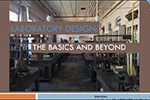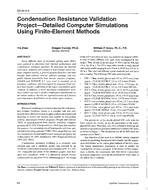Click here to purchase
Advancements in whole building energy modeling have coincided with the demand for improved building energy performance and have become a useful tool in determining optimal configurations of energy saving measures on the path to net zero building. This study presents a multi-objective optimization analysis in which passive energy conservations measures of a high performance house in Toronto are evaluated for life cycle cost and performance. The main objective of the study was to identify economically efficient design solutions that may be used to inform future efficient housing design and housing performance standards. An optimization environment was created using the JEPlus software suite where a case study house acted as the reference building. The simulation model of the case study house was calibrated using a data-driven procedure with reference to utility bill data, air-temperature sensors, and short term spot measurements. Acceptable CV(RSME) and NMBE tolerances for monthly natural gas and electricity consumption as well as zone air temperature were reached in accordance with ASHRAE Guideline 14 calibration requirements. The optimization varied passive energy efficiency parameters in search of configurations yielding optimal building performance and life cycle cost. The optimization results showed that energy savings of 33% relative to building code minimum were justified at the point of minimal life cycle cost via passive energy saving measures alone before considering active systems. These results suggest that improved thermal envelopes are economically advantageous with good building practice. However, they suggest that the current Passive House standard does not coincide with the economic minimum for the local economic and environmental climate.
Citation: 2016 Winter Conference, Orlando, FL, Conference Papers
Product Details
- Published:
- 2016
- Number of Pages:
- 8
- Units of Measure:
- Dual
- File Size:
- 1 file , 1.5 MB
- Product Code(s):
- D-OR-16-C072


